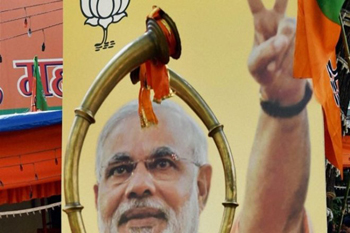New Delhi, Jan 10: The Election Commission has asked the poll machinery in the five poll-bound states to either cover or remove photographs of political leaders on all hoardings and advertisements which seek to project the achievements of any living political functionary or political party.
 The commission gave these fresh directions by reiterating its instructions issued on December 12, 2004 after the chief electoral officer of Goa raised the issue after the election schedule was announced on January 4. The poll watchdog said photos in advertisements or hoardings of similar type should also be removed or "covered suitably" so that spirit of its instructions is fully complied with.
The commission gave these fresh directions by reiterating its instructions issued on December 12, 2004 after the chief electoral officer of Goa raised the issue after the election schedule was announced on January 4. The poll watchdog said photos in advertisements or hoardings of similar type should also be removed or "covered suitably" so that spirit of its instructions is fully complied with.
It, however, made it clear that hoardings put up by the government which convey general message to the masses on family planning or social welfare schemes "may be allowed to be displayed". "However, all those hoardings, advertisements which seek or purport to project the achievements of any living political functionary or political party and which carry their photos or name or party symbol should be removed forthwith...
"...No political party or functionary can use public resources and incur or authorise expenditure from public exchequer to eulogise himself or itself or enhance his/its own or any political leader's image," it said.
The poll panel made it clear that such images or hoardings "undoubtedly amount to their individual/party election campaign at public cost". Between February 4 and March 8, Uttar Pradesh, Uttarakhand, Punjab, Goa and Manipur are going for Assembly polls and the Model Code of Conduct came into force on January 4 when the schedule was announced.




Comments
Amazing! This blog looks exactly like my old one! It's on a
totally different topic but it has pretty much the
same layout and design. Wonderful choice of colors!
Here is my homepage - Jim: http://yahoo.net
Put Black ink or Cow dung on Fenku's poster so that his face can hide..
Modi no 1 on this list of people using public exchequer
Add new comment